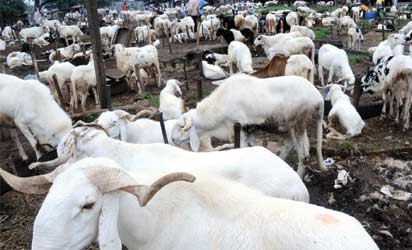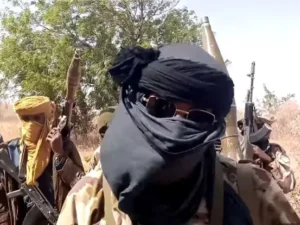
Sallah: Hardship Forces Many Muslims To Abandon Ram, Cow Slaughter
Hyper-inflation and economic hardship may have prevented many Muslims from fulfilling the tradition of animal slaughter as they celebrate Sallah today.
An investigation by SentinelNewNG.com found that livestock sellers across the country are struggling with low patronage, while buyers lament the steep rise in prices for rams, cows, and other animals.
Notably, the cost of livestock has surged by approximately 100% compared to last year. A small ram that sold for N80,000 last year now costs N200,000, while larger ones go for as much as N800,000. The price of cows now starts at N750,000.
Recall that earlier this year, the Niger Republic banned the exportation of livestock to other countries, including Nigeria, which is the largest consumer of animals during Sallah. This ban has significantly worsened the scarcity and high prices of livestock in Nigerian markets.
Reports revealed that the low patronage and soaring prices are largely due to the continued closure of the Nigeria-Niger border, which has disrupted the steady flow of livestock imports.
The situation, compounded by the current economic hardship and rising inflation across the country, has made it difficult for traders to maintain reasonable prices—ultimately pricing many potential buyers out of the market
In a price survey at key livestock markets in Jigawa State—particularly Shuwarin Market—ram prices ranged from ₦180,000 to ₦980,000, with the lowest-priced ram going for ₦160,000. Camels and bulls were seen selling from ₦780,000 to over ₦1 million each.
At the Maigatari International Cattle Market, Mustapha Nura, a major cattle dealer on Thursday, revealed that: “The border closure has affected our business significantly. We rely heavily on imports from the Niger Republic, but the restriction has led to reduced inflow of animals into Nigeria, driving up prices.”
Similarly, Aminu Bashir, another cattle seller at Gujungu Market, lamented: “The situation is dire. Many households may not be able to afford the traditional Eid sacrifice this year due to the high prices. The federal government’s policies since the removal of fuel subsidy in 2023 have exacerbated the hardship.”
Ghali Adamu, another major cattle seller at Sara Market, echoed similar sentiments: “The prices this year differ from those of last year. They range from ₦180,000 to ₦980,000 for rams. Many buyers are hesitant to purchase due to the high cost.”
He argued that government policies—particularly the removal of fuel subsidy—have worsened inflation and economic difficulties across the country.
The cattle sellers are urging the federal government to reconsider its policies and provide relief to ease the economic burden. They believe such intervention would help stabilize livestock prices and make the Eid sacrifice more accessible to the average household.
Some prospective buyers expressed their frustration with the unaffordable prices. Sharu Labaran, a buyer at the Maigatari Market, said: “I had budgeted ₦200,000 for two rams, but now the prices are almost double. I’m not sure if we’ll even be able to afford one this year.”
Another buyer, Umar Aliko at Shuwarin Market, added: “The economic situation is tough, and the federal government’s policies have made it difficult for us to afford basic necessities. The high cost of livestock is just another burden. We may have to skip the traditional Eid sacrifice this year because of the exorbitant prices.”
Both sellers and buyers agreed that this year’s high livestock prices could lead to a difficult Sallah for many households. They appealed to the government to take urgent action to address the ongoing economic challenges and make it easier for people to afford not only the traditional Eid sacrifice but also other essential needs.
In Islam, the slaughtering of animals on Eid-el-Kabir is a highly symbolic tradition. Muslims typically purchase rams, sheep, bulls, cows, or goats to commemorate the day.
Ustaz Dauda Muhammad, an Islamic cleric in Dutse, explained the religious context in an interview with our correspondent:
“The slaughtering of animals for Sallah is not compulsory but rather a Sunnah. As Allah says in the Quran, ‘It is neither their meat nor their blood that reaches Allah, but it is piety from you that reaches Him.’ Those who can afford it should do so, but those who cannot should not feel disturbed.”
The combination of low patronage and high prices has raised concern among many households, with a significant number of Muslim faithful this year likely considering skipping the traditional Eid sacrifice (Hadya) due to financial constraints.
- Dangote names road to refinery after Tinubu
- The inner meanings of ‘Id Al-Kabir
- How oil marketers forged documents to claim multi-billion naira subsidy – Ex-EFCC boss
Share your story or advertise with us: Whatsapp: +2348033202396 Email: sentinelnewsng@gmail.com








